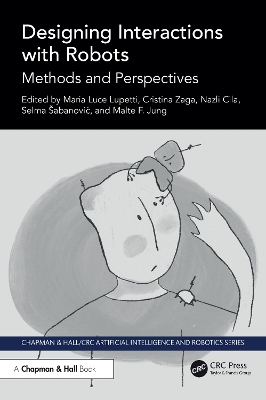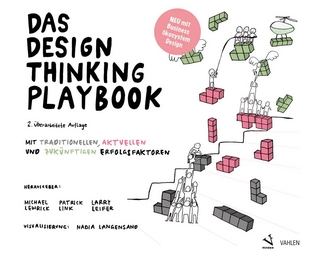
Designing Interactions with Robots
Chapman & Hall/CRC (Verlag)
978-1-032-43027-0 (ISBN)
Developing robots to interact with humans is a complex interdisciplinary effort. While engineering and social science perspectives on designing human–robot interactions (HRI) are readily available, the body of knowledge and practices related to design, specifically interaction design, often remain tacit. Designing Interactions with Robots fills an important resource gap in the HRI community, and acts as a guide to navigating design-specific methods, tools, and techniques.
With contributions from the field's leading experts and rising pioneers, this collection presents state of the art knowledge and a range of design methods, tools, and techniques, which cover the various phases of an HRI project. This book is accessible to an interdisciplinary audience, and does not assume any design knowledge. It provides actionable resources whose efficacy have been tested and proven in existing research.
This manual is essential for HRI design students, researchers, and practitioners alike. It offers crucial guidance for the processes involved in robot and HRI design, marking a significant stride toward advancing the HRI landscape.
MARIA LUCE LUPETTI Maria Luce Lupetti is an Assistant Professor in Interaction and Critical Design at the Department of Architecture and Design at Politecnico di Torino (IT). Her research is concerned with all matters of human entanglement with the artificial world, especially concerning complex technologies such as AI and robotics. She also serve as Exhibit X section editor for Interactions Mag. She is a former core member of the AiTech Initiative on Meaningful Human Control over AI Systems and of the Automated Mobility Lab, at TU Delft, where she worked for several years. Maria Luce Lupetti received a PhD cum Laude in Production, Management and Design from Politecnico di Torino, in Italy, for her research through design investigations into the field of educational robotics for children. CRISTINA ZAGA Dr. ir. Cristina is an assistant professor of Human-Centred Design group and DesignLab at the University of Twente (NL). Cristina’s research aims to foster societal transitions towards justice, care, and solidarity, with a focus on future of work and care with robots and AI. They lead the Social Justice and AI networks, working towards mitigating the dehumanizing effects of AI and promoting social and environmental justice. Their award-winning work has received many accolades, including the NWO Science Price for DEI initiatives (2022), the Dutch High Education Award (2022), and the Google Women Techmaker Award and scholarship (2018). NAZLI CILA Nazli Cila is an Assistant Professor at the Department of Human-Centered Design in Delft University of Technology (NL). Her work seeks to understand how to design symbiotic relationships between humans and AI while preserving individual, ethical and societal values, such as autonomy, enrichment, and justice. In addition to investigating design qualities and societal implications of human-AI collaborations, she is also fascinated by how designers and design researchers produce knowledge. This occasionally zeroes in on studying the complex landscape of robot design, at times, expands its focus to embrace design epistemology and methodology at a broader level. She is in the steering committee of the TU Delft AI Labs program and the co-director of the AI DeMoS Lab, investigating how to facilitate responsible design and use of AI for a meaningful democratic engagement. SELMA ŠABANOVIĆ Selma Šabanović is Professor of Informatics and Cognitive Science at Indiana University Bloomington. She studies social robotics and human-robot interaction, with a focus on exploring how robots should be designed to assist people in various use contexts, including mental health, wellness, education, and social participation. She works with current and potential robot users of all ages, from children to older adults, and in various cultures, including East Asia, Europe, and the US. She served as the Editor in Chief of the ACM Transactions on Human-Robot Interaction from 2017-2024, and currently serves as an Associate Vice President of the IEEE Robotics and Automation Society Educational Activities Board. She received her PhD in Science and Technology Studies in 2007 from Rensselaer Polytechnic Institute. MALTE F. JUNG Malte Jung is an Associate Professor in the Information Science Department at Cornell University and the Nancy H. ’62 and Philip M. ’62 Young Sesquicentennial Faculty Fellow. His research brings together approaches from design and behavioral science to build understanding about how we can build robots that function better in group and team settings. His work has received several awards including an NSF CAREER award. He holds a Ph.D. in Mechanical Engineering, and a PhD Minor in Psychology from Stanford University and a Diploma in Mechanical Engineering from the Technical University of Munich. Prior to joining Cornell, Malte Jung completed a postdoc at the Center for Work, Technology, and Organization at Stanford University.
1. Introduction 2. Designing Artificial Agents: Appearance and Expressivity 3. Designing for Social Embeddedness: Mutually Shaping Robots and Society 4. Designing Human–Robot Ecologies: Beyond Utilitarian Relations 5. Designing Robotic Imaginaries: Narratives and Futures 6. Choosing Materials for Personal Robot Design 7. Designing Robots that Work and Matter 8. Critical Perspectives in Human–Robot Interaction Design 9. Understanding Designerly Contributions 10. Toward a Future Beyond Disciplinary Divides
| Erscheinungsdatum | 18.10.2024 |
|---|---|
| Reihe/Serie | Chapman & Hall/CRC Artificial Intelligence and Robotics Series |
| Zusatzinfo | 3 Line drawings, black and white; 35 Halftones, black and white; 38 Illustrations, black and white |
| Sprache | englisch |
| Maße | 156 x 234 mm |
| Themenwelt | Informatik ► Software Entwicklung ► User Interfaces (HCI) |
| Informatik ► Theorie / Studium ► Künstliche Intelligenz / Robotik | |
| Recht / Steuern ► Privatrecht / Bürgerliches Recht ► IT-Recht | |
| Technik ► Umwelttechnik / Biotechnologie | |
| ISBN-10 | 1-032-43027-3 / 1032430273 |
| ISBN-13 | 978-1-032-43027-0 / 9781032430270 |
| Zustand | Neuware |
| Informationen gemäß Produktsicherheitsverordnung (GPSR) | |
| Haben Sie eine Frage zum Produkt? |
aus dem Bereich


